I Broke the Chain and Lived to Tell About It
I broke the chain! The chain habit, that is. I didn’t do my daily goal of one blog sentence, one book sentence on June 30th or July 1st. And there was no earthquake, as I feared would happen if I broke the chain, although it was ungodly hot in Seattle on the 1st day of July. Not my fault! I don’t think….
I fully expected to repeat the chain until my book was finally finished or I died, whichever came first. But I got the stomach flu in the early hours of June 30th, and that was it.
I’m not even upset about it. I started recovering and picked up where I left off. Better, perhaps, because I got a lot more writing done today than I did any other day in June.
It was a tough month. I hurt my wrist from overusing a standard mouse and keyboard instead of my ergonomic ones. Then when I tried to limit my wrist movements when using my computer, I activated an old carpal tunnel injury.
That meant weekly trips to the physical therapist and acupuncturist and as little time on my PC as possible. It also meant that my regular yoga practice was disrupted since I couldn’t put weight on my wrist. I went to a few classes but ended up doing more watch-asanas than practicing and stopped going. So I wasn’t exercising like I usually do, and that made me feel sluggish.
Then my poor cat got sick and lost 15% of his already tiny body weight. At first I thought it was stress because we’ve had a lot of upheaval on the home front lately, but the vet diagnosed hyperthyroidism.
Add to that planning a two and a half week trip to Italy, finishing my biggest consulting project and bidding on a series of new ones, and it was a long, challenging month.
Through all of that, I still accomplished my daily chain goals. Even on my worst day, when I was exhausted and everything seemed to go wrong, I completed two sentences before I went to bed.
On many days in June, two sentences were all I did. So even though I kept the chain going, I wasn’t making much progress. I comforted myself with the thought that some forward movement was better than none.
And then the flu.
My relentless determination met its match and in a way, I’m glad I broke the chain. I was getting by on the minimum and now I’ve had to reset and start over fresh.
So my little calendar has two days with no checkmarks. That’s ok. I’m back on my feet and neither Milo nor I have vomited in four days. Italy hotels are booked. My right arm is strapped with arm and wrist braces that make me look like a futuristic gladiator, but I can type without wincing. And maybe even yoga tomorrow.
People underestimate the importance of their work environments
Is it just me, or does anyone else find a picture of a person with their laptop and their feet in the sand disturbing? The glare from the sun, specks of sand getting on the keyboard, wind and bugs. And why not get your work done first and then go outside on the beach?
I’ve heard people say to knowledge workers, “you should be able to work anywhere.”
Sometimes this is said to employees who sit in ugly, gray cubicles with bad lighting and lots of noisy distractions. Or to temps and consultants who are asked to be productive in cramped vendor bays with six other workers and slivers of desk space, with chairs and desks that don’t adjust in height. One team that I worked with asked a vendor to do his work from a table squeezed in a narrow hallway until the fire marshal said he had to move.
It is true that you can take your laptop anywhere with a wireless connection and be able to send email, and work on documents, spreadsheets and PowerPoints. But there’s more to it than that.
I’ve met many consultants, writers and entrepreneurs who love to work out of coffee shops. Some of them hunker down in their favorite café, day after day, until they are so familiar with the staff and other regulars that they are almost like coworkers.
Other people I know – the writers especially – have a series of hangouts that they’ll visit throughout the day. They’ll write for a couple of hours at one spot, then move to the next.
For me, my home office is the best place for me to work. I constantly refer to the marked up printed pages of my manuscript on my bookshelf. The sticky notes that outline my chapters are in rows on my filing cabinet. Each time I make a change to the order or content of each chapter, I update the notes. Technically, these things are paper and I could move them from place to place. Psychologically they’re the structure of my book and I need them in order and easy to reach.
For my consulting work, I also have hard copies of files that I refer to frequently. I have headphones for conference calls, a smart card reader, backup drives and my printer/scanner. Plus, an ergonomic mouse, keyboard and footrest. Anyone who’s had carpal tunnel, tennis elbow or wrist injuries from overusing a regular keyboard and mouse will understand how non-trivial these things are. Non-trivial and not very portable.
Beyond the physical elements that make me productive in my own office, there is the benefit of a consistent routine. When I sit down at my desk, my brain knows it is time to get to work. It’s where I’m able to focus most consistently and repeatedly, day after day.
So while technically it is possible to work almost anywhere with a laptop and wireless connection, how effective is it? And more importantly, do you want to?
Employee Stress vs. Entrepreneur Stress
I had stress when I worked a full-time corporate job. I have stress now. What’s the difference?
Corporate stress came from unrealistic workloads, office politics and being asked to participate in business decisions that I disagreed with. Working in a stressful environment is like breathing in low levels of poisonous air every day. It won’t kill you all at once. It is a long, slow decline.
Entrepreneur stress is completely different. It is the flip side of the positives parts of working on my own. It comes from the pressure I put on myself to spend more time on my projects. It’s learning Quickbooks and all kinds of marketing and operational tasks that I used to have corporate resources to help me execute. It’s the uncertainty of not having a scripted career path.
This kind of stress is much easier to live with. I can decide how many hours to spend on my business and writing projects. I can outsource tasks that aren’t my strong points and that I don’t enjoy doing. I can tame my thoughts when I worry.
All stress is not created equal.
Making Progress
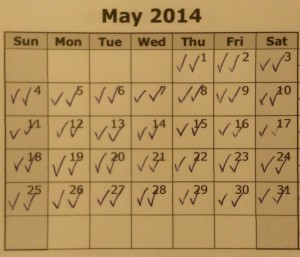 I recently completed my first month of the Chain Habit. It was so easy that I wish I started a long time ago. It’s as simple as making a commitment to take a specific action every day, no matter what. My commitments are “one book sentence, one blog sentence.” Small and achievable.
I recently completed my first month of the Chain Habit. It was so easy that I wish I started a long time ago. It’s as simple as making a commitment to take a specific action every day, no matter what. My commitments are “one book sentence, one blog sentence.” Small and achievable.
Admittedly, some days are easier than others. My best days are when I get out of bed around 6AM and get right to work on revising my manuscript or writing a blog post. Other days, like yesterday, I feel such resistance that I didn’t open my word document until late in the evening. I’m working on a chapter about being financially prepared before quitting a job, and the individual topics aren’t flowing together easily. All day instead of working on this chapter, I imagined myself staring at the pages, not knowing how to fix them. It was overwhelming.
That reluctance carried over into everything on my to-do list. I felt immobilized all day, unsure of which project or task to work on from one moment to the next. I didn’t feel like doing anything, yet was propelled by anxiety to do something. Finally, at 9:30PM last night, I opened my word document and worked on my manuscript. I deleted some sentences, moved paragraphs around, and created a completely new worksheet to help people estimate their current and future expenses. Progress.
Revising my manuscript isn’t the hardest thing I’ve done – not even close. I like the process of editing. In fact I recently revised two bulky process documents as part of my consulting work, and enjoyed doing it.
You know what the hard part of reworking my book is? Sitting in my chair, opening my word document and doing it. Finding the inner motivation is the hard work.
As I mentioned, it’s easier when I get started first thing in the morning. It also helps when I take a piece of notepaper and write down what I want to accomplish the night before. And receiving a compliment about my writing is often enough to make me stop whatever else I’m doing and start working on my book or a blog post. Is that a character flaw that external praise makes me get to work? I don’t care if it gets one more page out of me.
As an aside, I took Samuel Delaney’s workshop at the Summer Writing Program last summer. His perspective was that criticism is a better motivator than praise. His reasoning? After one of his books got outstanding reviews, he did nothing but walk around smiling for three days. And then he read a harsh review that was so unsettling to him that he immediately went to his desk and got to work again. He’s one of the most prolific authors I’ve ever heard of, so clearly that worked for him. I’m going to stick to the positive reinforcement.
As another aside, it was in Delaney’s workshop that I started writing my book.
Another character flaw is that it motivates me when I read something that I don’t like from an author who has sold a lot of books or who has great endorsements. It makes me think that my own book doesn’t have to be a masterpiece; it just needs to be published. And then I get back to work.
It took me thirteen hours before I did any writing and editing yesterday. And I suffered needlessly all day while I put it off. But I finally revised a few pages, and worked on a blog post and now I get to make two check marks on the calendar propped up next to my desk. Whatever works.
Multiplying by Zero
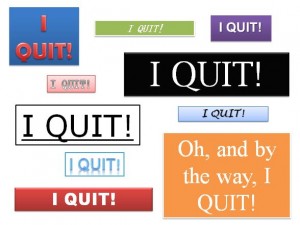 Years ago I was working for a company that I cared about enormously. I was loyal and worked hard and really wanted to be there. But during the last year or so of my employment, things got weird.
Years ago I was working for a company that I cared about enormously. I was loyal and worked hard and really wanted to be there. But during the last year or so of my employment, things got weird.
I would do something very well and it would be ignored. For example, the company used logos that were different sizes and fonts. I changed them to be consistent and not only did it look better, but it eliminated an entire set of decals that were being printed and stored, which saved about $5,000 every month. The reaction was somewhere between a yawn and a blank stare.
Another time I was chastised for not going out to dinner with a group of salespeople the night before a customer event. I skipped the dinner because I was at the office making final preparations late into the night. I prioritized making sure details were in place for a successful event. They prioritized the social aspect of having an evening out with their coworkers. I was told that it seemed like I wasn’t a team player. Huh? The event went well, anyway.
This stuff was so strange to me. I liked most of the people that I worked with and it was confusing to have people that I cared about say and do things that just didn’t make sense.
I will never forget the advice I got during a graduate school leadership class. I was explaining the situation to one of my classmates and he said that he had a job that was like that once. I asked him how he resolved the problem. His answer was “I quit and got a job somewhere else.”
That statement shifted my thinking. I had put all of my energy into trying to understand the situation and fix it because I truly wanted it to work out. I started to realize that no matter how much I wanted it to get better and despite believing that my work benefited the company, I was only part of the equation. Maybe that seems obvious to other people, but until then I kept thinking that if only I could figure out what to say or do, the people around me would act more rationally.
Not long after the conversation with my classmate, one of the vice presidents at the company bought everyone a copy of the book Who Moved My Cheese by Dr. Spencer Johnson. It’s a parable that basically says, “If you’re no longer getting what you need in your current environment, go get it somewhere else.” The minute I put down the book I picked up the phone and called a staffing company. I made the call on a Monday and on Friday I interviewed for a consulting contract. I was hired the next Monday. Eight months after that I took a full time position and spent another twelve years working there.
Most of my thirteen years there were great. The last few were not. Again, I had years invested in the company and there were enough good things about it that I kept looking for jobs on other teams and waiting for the next reorganization to see if it would make things better. None of that worked. I came up with my own analogy: it was like multiplying by zero. It didn’t matter how many hours I worked or what impact my programs had on the business. Everything that I did was cancelled out because where it intersected with the organization was like multiplying by zero. The end result is always the same. Zero.
One year ago today I quit that company. Now my happiness is multiplied each time I find projects that align with my values: working with people I respect, flexibility to work at home, the ability to make an impact through my projects and fair pay.
It isn’t always easy on my own, but the math makes sense.
An Abundance of Time, No Time to Waste
I had an abundance of free time.
After I quit my job and returned home from my summer writing program, I had things to do. Those things just didn’t take up much time. The startup business that I co-founded moved very slowly. I met with my business partner once each week and I completed the tasks I was responsible for in a few hours in between those meetings. And, I started writing a book. But I was only able to write for an hour or two a day before the part of my brain responsible for getting coherent sentences onto my PC would shut off.
That left a lot of free time.
I’d wake up in the morning, make tea, meditate, and then…
Exactly. And then what?
Exercise most days. Go to a writing group, visit a friend for lunch, read, or take a walk. Attend meetings for associations I belong to. Read poetry at open mic events. A little consulting and volunteering here and there. I took an eight-week improv acting class, visited three wild animal rescue centers, traveled to Idaho for a retreat and took two trips to California.
It wasn’t that I was wasting time. In fact I refused to waste time by watching tv, aimlessly surfing the web, playing games on my phone or doing anything that didn’t feel meaningful. I refused to be busy for the sake of distracting myself. And so without much distraction, I had A LOT of time to experience a full range of thoughts and feelings that otherwise I wouldn’t have time for.
It felt like I was on an endless silent retreat, left alone with my thoughts and feelings.
Some feelings were positive. Getting plugged into the Seattle writing community was fun and interesting, and sometimes I felt happy and excited about the projects I was working on. But I often felt uncertain and doubtful about whether I was spending my time on the right things. Should I be traveling more or volunteering overseas, since I had so much flexibility? There were plenty of hours when I was restless and wanted something else to do besides work on my business or write, but I didn’t know what.
Then I felt guilty for not enjoying the luxury of time that I had.
I made a list of activities that I felt were justifiable ways to spend my time. The title of this word document was “Meaningful Ways to Spend My Time that Align With My Values.” I’m not kidding. The list wasn’t all about work; it included options like gardening, hanging out at the park and emailing friends. Having an approved list of activities was an attempt to feel OK about how I was spending my time but it didn’t help much. I had a relentless sense of needing to be productive and make a positive contribution to the world. It’s both grandiose and deeply true.
I had great days when I got a lot of writing done or took an inspiring class. I had many more days when I felt like an unanchored boat being tossed by the waves.
All of that changed when I started a full time consulting position. I am much happier now, no question about it. I still write, work on my business, go to yoga and see friends. I have plenty of time, energy and the flexibility for those things beyond my day job. I didn’t need that list of approved activities – I needed predictable work that took up more time, gave me structure, earned income and allowed me to contribute on a daily basis.
Some people might do well with a lot of unstructured free time. Those people are either more enlightened than me or less driven. Or maybe they just like tv.
Ten Benefits of Working From Home
10. Feeling self-righteous about reducing my carbon footprint by not driving to an office every day.
9. The cafeteria is my kitchen and it’s always open.
8. No awkward chitchat in the restroom.
7. My work at home uniform = track pants and a t-shirt.
6. Wearing big ugly eyeglasses and not caring what I look like.
5. My office could not be better suited to me than if I had designed it myself…oh wait, I did design it myself.
4. Being at home for the plumber, the electrician and front door deliveries.
3. Not wearing shoes. Or makeup. Or a bra. And I’m not embarrassed to admit it because I’m not going to see you at the office anytime soon.
2. Less time commuting = more time to procrastinate working on my book.
1. Running after the cat with paper for him to throw up on as soon as the gagging noise starts. Seriously. When I make it in time I feel like a winner. I won!
Opting Out or Opting In?
A few months ago someone asked me if the change I made in my career was opting out of something or opting in.
Great question. The answer is both.
I opted out of a work environment that no longer fit me. I said no to long, exhausting hours spent on tasks that were required for my role but that I didn’t believe in. I said goodbye to a false sense of security that comes with a company job. I left work that I enjoyed because the price I paid for doing that work wasn’t worth it anymore.
I opted in to choosing work that supports the kind of life I want to live. I said yes to deciding how to spend my time and energy. I said hello to feeling both uncertain and exhilarated about the possibilities for my future. I began writing and consulting work which isn’t always fun but is worth every moment.
Sometimes it is about saying no in order to say yes.
The Value of Less
One of my favorite things about the time I spent in Boulder at the Jack Kerouac School was living in my simple student apartment.
From the moment I walked in the door, I loved it. Even though it was a small one bedroom apartment it felt spacious and airy because there was hardly anything in it. It took me thirty minutes to put away all the belongings I brought with me. Another thirty minutes to rearrange my bed and desk.
Without stuff, life is simpler.
I had one suitcase worth of clothes, my computer, notebooks and not much else. The apartment came with a sofa, table, chairs, bed, desk and a few pieces of cookware and utensils in the kitchen. No microwave. No extra stuff – just the basics to live day to day.
It didn’t take long to decide what to wear because there wasn’t a lot to choose from. Which of my three tank tops to wear with jeans? Or which of my four dresses to pull on? If I was going to school, I wore my sandels. If I was walking anywhere else, sneakers.
I got so much writing done sitting at the desk in my bedroom. The walls were blank, so all of the ideas came from my head. No visual stimulation to distract me.
Returning home after living so sparingly was a shock. I felt like my house was screaming at me. Everywhere I looked there was stuff.
I decided to get rid of half of everything I owned. Much of what I had didn’t make sense for my new life. They were artifacts of the old life that I left behind when I quit my job and went out on my own. I didn’t want the clothes that I used to wear to work hanging up in my closet. I didn’t want boxes of computer equipment clogging up my bookshelf. I wanted blank space.
It was a good goal, but getting rid of half of everything I owned turned out to be more ambitious than what I was prepared to part with. After carloads of donations dropped off at the Goodwill, I hadn’t given away a even quarter of what I owned, and there were things that I wasn’t ready to part with. I wasn’t ready to give away the furniture that I inherited after my grandparents passed away. I didn’t want to get rid of Christmas decorations, cheese knives or nail polish. Even though I rarely use those things, the last thing I intended was to get rid of something only to repurchase it when I wanted it later.
I changed my goal to creating an empty drawer or shelf in every room of the house. That was doable.
I love these pockets of blank space. Especially around my desk, where I work. The less stuff I have in my line of sight, the more ideas make it out of my head and onto my PC.
I still have more stuff than I need or want. But I have much more breathing room.
How to Get Stuff Done When You’re Working For Yourself
I’m a productive person. I like to get stuff done. I’m not new to this. I make lists, I use Outlook to schedule my days and my tasks. I have a spreadsheet of running projects and detailed steps to complete them.
But now it’s 5:14PM, I’ve got to leave for yoga at 5:30PM and where did the day go? I did my day-job stuff. I emailed the landscaper to follow up on a quote. I updated expense information for my startup business. I sent three personal emails. So it’s not like I wasted the day. But crap. I’m staring down a weekly to-do list full of tasks that I haven’t done yet, including making progress on my two most important goals: revising my manuscript and updating my blog. Staring at a list full of things to do that are not checked off feels like staring the in the face of futility.
I’m irritated with this day.
I did not get up early to work on editing my book and I didn’t work on it during lunch. I just…ate lunch. OK it’s after work and I’m writing this blog post. But now it’s 5:17PM and I have 13 minutes until I need to be in the car, on my way to yoga.
This isn’t working.
I didn’t want working on my book or blog to feel like pressure or a chore, or something negative that I dreaded. Nobody is forcing me to do these things. My deadlines are made-up.
That’s the problem. I’m really good at meeting deadlines imposed by structures outside of myself. Whenever I’ve taken classes, I’ve always done my homework and turned in my assignments on time. I pride myself on always hitting my work deadlines.
But when it is my own deadline, it’s much easier to blow off.
5:27PM. Got to go. Dammit. Just when I was getting somewhere with this blog post.
May 1st, 2014, 6:28AM
Milo kept walking on me and making noise so I got up. I wanted to be up before 7AM anyway to work on my book and this blog post before I start my day job. So now I’m up and my eyes are barely focusing. Is this how it has to be? In order to make progress on my writing I have to be pushed into it?
When I was working my corporate job and running on adrenaline I got a ton of stuff done. I was always going, rushing, doing. Since I’ve unplugged from that machine, I’m on a slower pace. I’m still efficient with specific projects, but I don’t get as much done in a day. Transitions take longer.
I’ve been emailing a friend about this topic and he sent me a link to this article about Jerry Seinfeld’s Chain Habit. The idea is to put an X on a calendar for every day you work on your goal. When you see the lines of X’s, you don’t want to break the chain.
It’s like when we were kids and we got a little star sticker for each day that we did whatever task we were supposed to do. Except that back then, it didn’t motivate me. I felt manipulated and the reward of a sticker wasn’t stronger than my drive for autonomy.
But now I’m only struggling against telling myself what to do, and making a daily commitment worked for me in the past. When I finally got my first draft written for my book, it was because I committed to opening my word doc every single day and writing one sentence. Even on Thanksgiving and Christmas Day when I was at my parents’ house, I had my PC with me. Of course once I had the word doc open I wrote a lot more than one sentence.
I’ve been frustrated with how little I’ve done to revise my book, and think the solution is the same one that I did with the first draft – to commit to opening the word doc and revising one sentence every day. I kept deluding myself that I need larger chunks of time to get my head into editing mode, but I haven’t been using the big blocks of time that I do have so it’s time to try something else.
There’s got to be a way of making significant progress without resorting to becoming addicted to the process. Or maybe there isn’t. Because the Chain Habit or committing to writing every day no matter what feels like an addiction as much as a habit.
Maybe the difference is limiting the time spent. Maybe it is healthy enough to be addicted to writing a bit every day if I also do my day job well and keep enough time in my day for the other things I want to do plus a certain amount of unstructured time each week.
I emailed my friend about this and he wrote back musing about the difference between addiction and habits. I found an article on the topic that says habits can be good or bad and we have control over them. Addiction is negative and compulsive.
When I was in the habit of writing for my book every day, it felt good to make daily progress. Most of the time I wrote in the morning and started the day feeling good about working toward my goal. The times when it was late at night and I was tired and didn’t want to open my computer, I felt a sense of panic and did it anyway. I felt a compulsion. I did the work even when I didn’t want to, even when it was difficult to get to my PC, because I didn’t want to feel disappointed in myself for not doing it.
I wish I d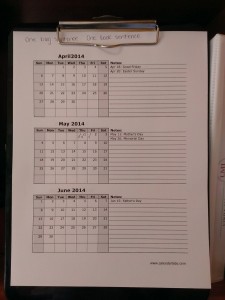 idn’t have to pressure myself or create a situation where I feel afraid and dread if I don’t work on my writing. But at this point, the desire to achieve my writing goals is bigger than the desire to avoid bullying myself into doing the work.
idn’t have to pressure myself or create a situation where I feel afraid and dread if I don’t work on my writing. But at this point, the desire to achieve my writing goals is bigger than the desire to avoid bullying myself into doing the work.
I also hate being tied to my PC, but my PC is where my work happens. If I know I’m going to be away from my PC, I could save my files on OneDrive and at least go through the motion of opening the docs on my phone and writing. I could also write a blog post long-hand in my notebook and transcribe it later, and do the same with my book revisions, but it isn’t as effective as typing into my word doc. They aren’t perfect solutions but I guess I’d rather use these contingencies than “break the chain”. I’d rather have these backup plans in place than not set my goal in the first place.
May 2, 2014, 7:38AM
I got up at 6:30AM again today, and went right to my PC to work on this blog post. It’s day two of my new chain habit, and I can already X-off this goal. There’s still a little time to open my book document and revise at least one sentence today.
Then I’ll make a cup of tea and raise a toast to myself: here’s to my new addiction.

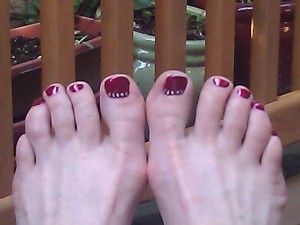
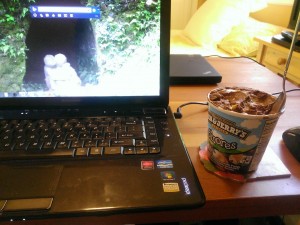

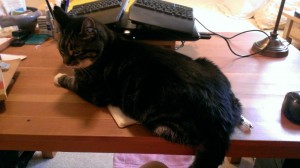
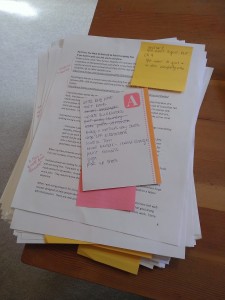
Recent Comments